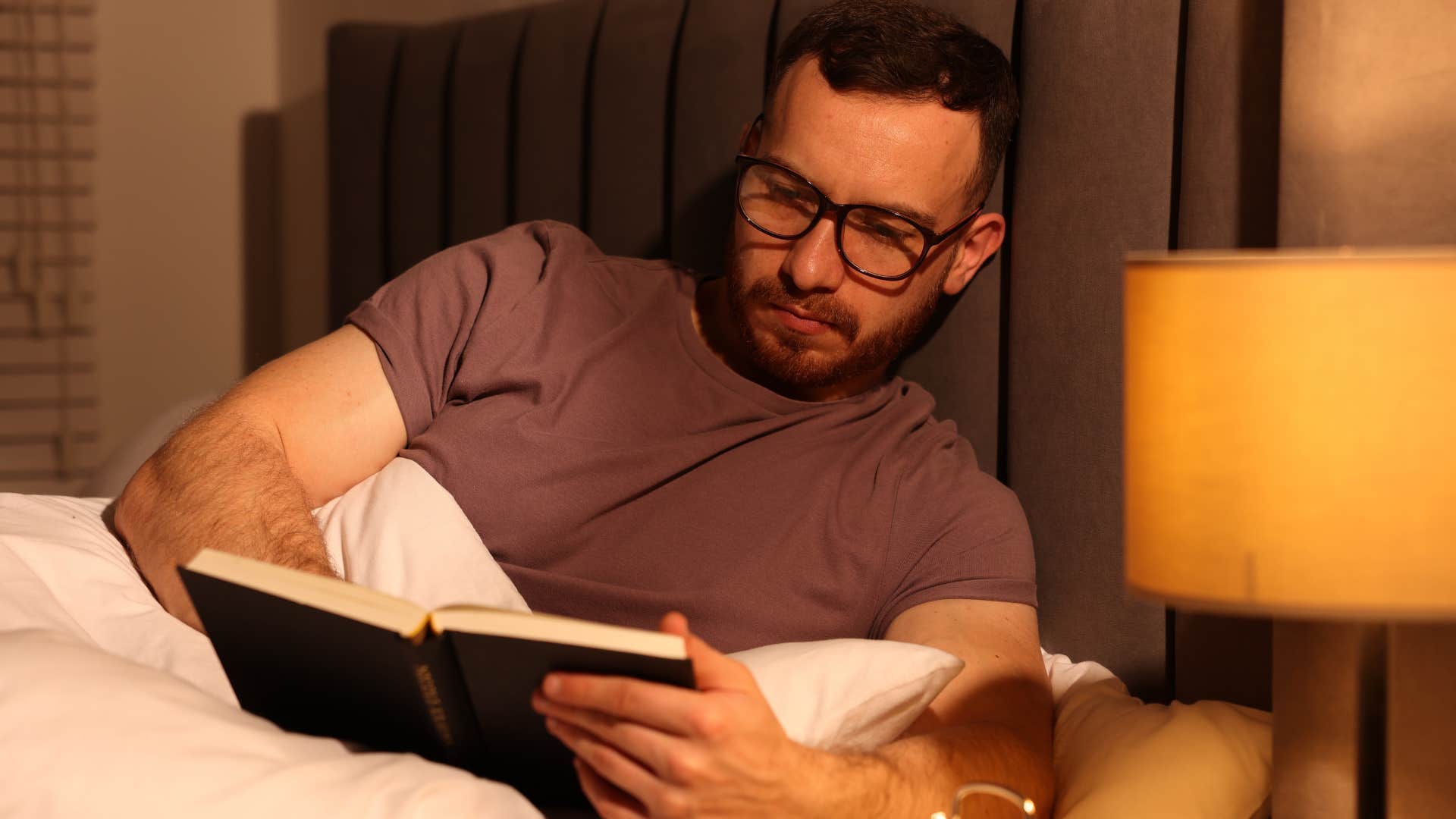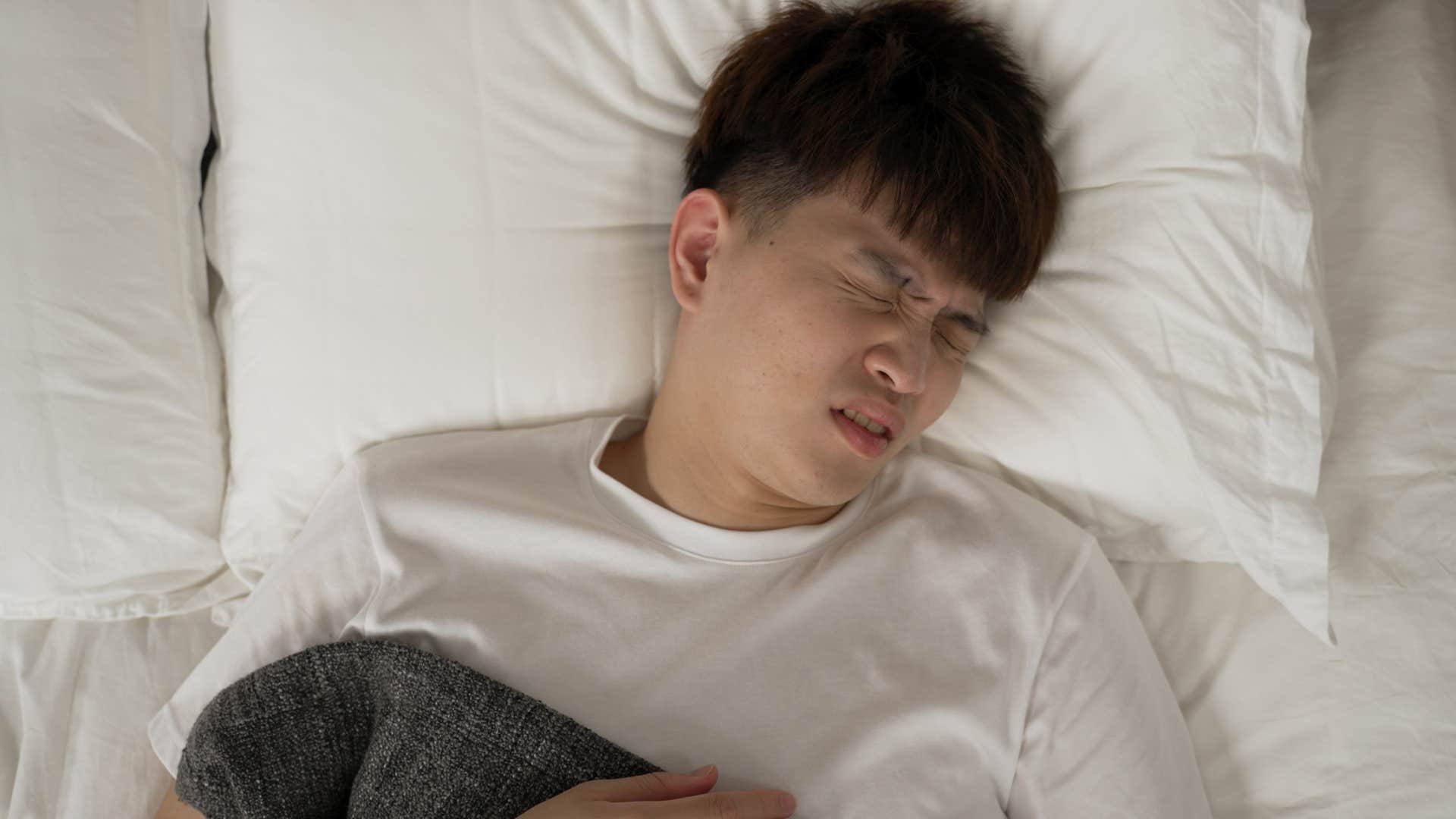If You're A Night Owl Who Stays Up Later Than Everyone Else, You Probably Have These 11 Rare Traits
Night owls' evening rituals and behaviors aren't just a preference.
 Stock-Asso / Shutterstock
Stock-Asso / Shutterstock Night owls, who tend to stay up late and wake up later in the morning, reap a number of benefits and boast certain traits that are generally overlooked in our culture that celebrates early risers, constant productivity, and early morning routines. It seems like every health guru and lifestyle coach online is always boasting about their 5 AM wake-up time, morning rituals, and productivity before the sun comes up. Still, there are actually several benefits to being a night owl who does the opposite.
From creativity to a high IQ and even sociability, if you’re a night owl who stays up later than everyone else, you probably have these rare traits. Night owls have been found to have superior cognitive function compared to early risers, which sets them up for success as they navigate their day.
If you’re a night owl who stays up later than everyone else, you probably have these 11 rare traits
1. Creativity
 PeopleImages.com - Yuri A | Shutterstock.com
PeopleImages.com - Yuri A | Shutterstock.com
Studies show that night owls tend to reach their peak strength at around 9 PM, giving them a burst of energy and inspiration in the evenings to put toward creative projects, imagination, and inspiration-driven projects. Of course, there’s always been a link between sleep, dreams, and creativity that researchers have been investigating for decades.
Some creative visionaries even leverage the creativity of their early-stage dreams by holding a heavy object that would jolt them awake when they drifted off into deeper sleep. So, it’s not just late-night thoughts, quietness, and evening inspiration that night owls benefit from creatively. It’s also their tendency to leverage naps and passing dreams during the day.
2. High intelligence
 New Africa | Shutterstock.com
New Africa | Shutterstock.com
According to a study published in the BMJ Public Health journal, people who sleep between seven and nine hours a night tend to boast the highest levels of cognitive function during the day, but it’s actually night owls who consistently score higher on cognitive and IQ tests than their early rising counterparts.
Disruptions to a person’s circadian rhythm, like staying up too late when you’re most productive and active in the early morning, can be detrimental to personal wellbeing, productivity, and cognitive abilities, as a 2018 study argues. However, for night owls, who are most active in the late evenings, staying up later can actually promote more cognitive benefits than trying to set an early bedtime.
According to neurologist Clifford Segil, the most important takeaway from this research on chronotypes and sleeping patterns is that getting enough sleep is the key to boosting wellbeing, brain health, and productivity. Of course, if you’re a night owl or an early riser, that plays a role in shaping your sleep routine, but as long as you’re maximizing the quality and duration of sleep, that’s what truly makes a difference in shaping well-being and cognition overall.
3. Impulsivity
 Zamrznuti tonovi | Shutterstock.com
Zamrznuti tonovi | Shutterstock.com
Night owls generally report more impulsivity than their early morning counterparts, according to the American Academy of Sleep Medicine, especially younger adults and teenagers already experiencing negative emotions consistently in their lives.
They exhibit greater negative urgency and perseverance than their early morning counterparts, two key indicators of impulsive behavior, and tend to make riskier decisions and engage in riskier behaviors more frequently than others. Especially if they’re consuming caffeine in soda, coffee, or caffeinated energy drinks late into the evening, they’re more likely to engage in reckless actions and risky behaviors.
4. Problem-solving
 Gorodenkoff | Shutterstock.com
Gorodenkoff | Shutterstock.com
According to a study from the University of Madrid, night owls don’t just score better on cognitive ability and school performance tests, but they also boast a higher level of inductive reasoning, connecting personal experiences with broader issues and conversations, than others. With a stronger mental process for making decisions, it’s not surprising that they’re better problem-solvers than many people, excelling at piecing together complex problems and providing innovative solutions.
They may also boast better relationships because of this problem-solving skill, considering they’re more likely to remember little things about other people, make inferences that boost bonding and connection, and reap the benefits of long-term conflict resolution on health.
5. Psychopathy and narcissism
 MAYA LAB | Shutterstock.com
MAYA LAB | Shutterstock.com
While there’s certainly evidence to suggest that narcissism is becoming a less rare trait than it was a few decades ago, other less common personality traits associated with the “Dark Triad,” like psychopathy and machiavellianism, are found in night owls at higher rates.
According to a study published in the Personality and Individual Differences journal, people with a night-time chronotype, aka night owls, are linked with personality traits of the Dark Triad. Some argue that a nighttime disposition is rooted in social isolation, which is why people who are night owls often have more antisocial tendencies, playing into their rare personality traits revolving around the Dark Triad.
6. Centrality in social networks
 PeopleImages.com - Yuri A | Shutterstock.com
PeopleImages.com - Yuri A | Shutterstock.com
Despite often harboring anti-social tendencies at night, studies show that night owls tend to be the center of their social networks and friend groups, maintaining more diverse quantities of relationships, even if that means investing less intentional time into each person or connection.
Whether it’s at work, in their personal lives, or within their families, they tend to be the focal point and center of attention in their social circles, always having someone to text or talk to when they’re bored at night, staying up late.
7. Introvertedness
 Stokkete | Shutterstock.com
Stokkete | Shutterstock.com
Even though they’re the focal point of social networks and equally isolated from all of them at the same time, depending on the day, introverted people also tend to be night owls. They appreciate the solitude of the evening, away from draining social interactions and superficial interactions, which is why they have a preference for staying up late.
Ironically, their social environments and interactions during the day rarely affect the quality of their sleep at night, compared to extroverted people who tend to be more vulnerable to sleep deprivation in the same situations. If you’re a night owl who stays up later than everyone else, you're probably introverted, but still capable of maintaining boisterous social networks, while also protecting your alone time.
8. Procrastination
 Paul Schlemmer | Shutterstock.com
Paul Schlemmer | Shutterstock.com
Night owls are more likely to fall into procrastination tendencies than their early-rising counterparts, not just with tasks during the day or at work, but also at night, putting off their bedtimes.
A different study published in the Psychological Science journal suggests it’s night owls’ tendency toward impulsivity that’s linked with their procrastination behaviors and habits. They prefer to seek instant gratification and comfort over leveraging self-discipline to achieve delayed relief and rewards from long-term projects, goals, and work.
9. Tendency toward vivid dreams
 PRPicturesProduction | Shutterstock.com
PRPicturesProduction | Shutterstock.com
Many night owls suffer from more nightmares and experience more vivid dreams than their early-rising counterparts. According to psychiatry professor Yavuz Selvi, this trait is associated with their sleeping patterns, and their nighttime tendencies are often associated with poorer sleep quality, mental health disorders, and chronic stress.
Whether it’s hyperactivity in the brain or sleep deprivation, if you’re a night owl who stays up later than everyone else, you probably have some of these rare traits, whether it’s nightmares or mental health struggles.
10. Daydreaming
 Tiantip Deedet | Shutterstock.com
Tiantip Deedet | Shutterstock.com
Most people are best able to sustain their attention and cognitive function during their peak hours, which for night owls is around 9 PM, so when they’re trying to focus or get something done outside of those hours, it can be a struggle. When night owls are working outside these target hours of concentration, they’re more prone to mind-wandering and daydreaming.
During the day or in the morning, when their early-rising counterparts are maximizing their peak hours of productivity and concentration, they’re stuck with a wandering mind. Of course, in our culture, these people are generally labeled lazy or unmotivated, even if they’re more productive than their counterparts in the evening hours.
11. Altered medication responses
 Perfect Wave | Shutterstock.com
Perfect Wave | Shutterstock.com
According to a study published in the Biological Psychiatry journal, eveningness and people with evening chronotypes sometimes experience different efficacy and side effects from medications than their early rising counterparts.
Specifically for antidepressants and SSRIs, as the study investigates, night owls’ unique circadian rhythm and sleeping traits factor into their response to these medications and health treatments.
Zayda Slabbekoorn is a staff writer with a bachelor’s degree in social relations & policy and gender studies who focuses on psychology, relationships, self-help, and human interest stories.

